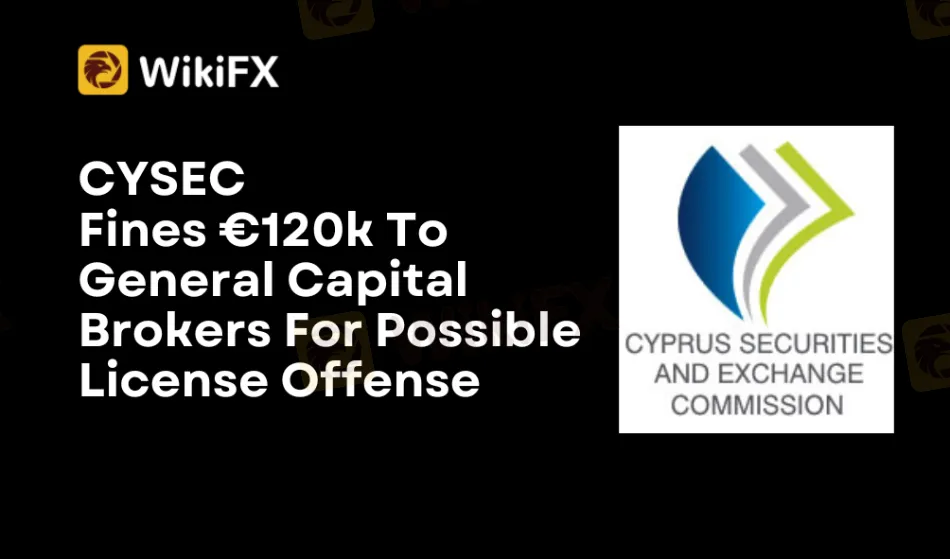简体中文
繁體中文
English
Pусский
日本語
ภาษาไทย
Tiếng Việt
Bahasa Indonesia
Español
हिन्दी
Filippiiniläinen
Français
Deutsch
Português
Türkçe
한국어
العربية
CySEC Fines €120k To General Capital Brokers For Possible License Offense
Abstract:On Friday, the Cypriot Securities and Exchange Commission (CySEC) announced that it had settled a lawsuit against Cyprus Investment Firm (CIF) General Capital Brokers Limited for €120,000 in damages.

The agreement covers any lapses that may occur between November 2020 and October 2021.
In August, CySEC agreed to a €100,000 loan from ICC Intercertus Capital.
The Cyprus Securities and Exchange Commission (CySEC) said on Friday that it had reached a deal with General Capital Brokers Limited, a Cyprus Investment Firm (CIF), for €120,000 in damages.
The broker may have broken the country's Investment Services and Activities and Regulated Markets Law of 2017, which will be taken care of by the settlement.
CySEC says that the fine makes up for the fact that the brokerage did not meet the requirements for its CIF authorization between November 2020 and October 2021.
The amount also makes up for the fact that the broker didn't meet the requirements for getting an operating license in the time allowed.
CySEC also said that General Capital Brokers did not follow the laws regarding general principles and information about clients.
The settlement amount has been paid by the broker, according to the financial markets supervisor.
The financial markets watchdog said all amounts payable related to settlement agreements are considered revenue (income) of the Republic's Treasury and do not constitute income of CySEC.
Settlement Enforcement
As the government agency in charge of the securities and trading markets in Cyprus, CySEC keeps an eye on the industry and makes sure that everyone follows the rules.
The regulator warned CFD brokers in July that if they did not change their ways, they would face regulatory action to improve compliance and protect customers.
The next month, CySEC gave ICC Intercertus Capital a fine of €100,000 for possibly breaking CySEC rules about how contracts of difference (CFDs) are marketed, distributed, and sold to retail customers.
F1 Markets and Magnum FX (Cyprus) both paid €150,000 to CySEC in the same month for potential compliance violations.
CySEC raised some concerns about Magnum FX's ability to meet CIF authorization and operating license conditions between January 2019 and July 2020.
Meanwhile, both companies had their licenses suspended for two weeks by CySEC in mid-2020.
About CySEC
CySEC, which stands for the Cyprus Securities and Exchange Commission, was set up in 2001 to control the Cyprus financial market. CySEC's financial rules and how it runs are in line with the European MiFID financial harmonization law.

CySEC has registered a large number of overseas retail forex brokers. Before 2018, CySEC was the preferred regulator for many binary options brokers.
CySEC is responsible for the following tasks:
To supervise and control the operation of the Cyprus Stock Exchange, as well as the transactions that take place on the Exchange, as well as the transactions of its listed companies, brokers, and brokerage firms.
Supervised and control of Licensed Investment Services Companies, Collective Investment Funds, investment consultants, and mutual fund management firms.
Investment firms, including investment consultants, brokerage firms, and brokers, must be granted operating licenses.
To levy administrative and disciplinary penalties on brokers, brokerage firms, and investment consultants, as well as any other legal or natural person who is subject to the provisions of the Stock Market legislation.
Stay tuned for more Regulated News.
To stay up to date on the latest news, download the WikiFX App from the App Store or Google Play Store.

Disclaimer:
The views in this article only represent the author's personal views, and do not constitute investment advice on this platform. This platform does not guarantee the accuracy, completeness and timeliness of the information in the article, and will not be liable for any loss caused by the use of or reliance on the information in the article.
Read more

The Daily Habits of a Profitable Trader
Every professional trader follows a structured approach to ensure they are well-prepared, disciplined, and able to seize opportunities with confidence. Whether you are a seasoned investor or an aspiring trader, adhering to a robust daily checklist can significantly enhance your performance. Use this checklist to check if you are a qualified trader

The Impact of Interest Rate Decisions on the Forex Market
Interest rate changes determine currency attractiveness, influencing capital flows and exchange rate trends. Understanding this mechanism helps investors navigate the forex market effectively.

How a Housewife Lost RM288,235 in a Facebook Investment Scam
A 47-year-old housewife in Malaysia recently fell victim to an online investment scam, losing a substantial sum of RM288,235 after engaging with a fraudulent scheme advertised on Facebook.

A Trader’s Worst Mistake: Overlooking Broker Reviews Could Cost You Everything
In today’s digital age, reviews influence nearly every decision we make. When purchasing a smartphone, television, or home appliance, we pore over customer feedback and expert opinions to ensure we’re making the right choice. So why is it that, when it comes to choosing an online broker where real money and financial security are at stake many traders neglect the crucial step of reading reviews?
WikiFX Broker
Latest News
The Withdrawal Trap: How Scam Brokers Lure Victims into Paying More
FCA to Investors: Think Twice Before Trusting These Brokers
Trump\s tariffs: How could they affect the UK and your money
Trump gambles it all on global tariffs he\s wanted for decades
TradingView Brings Live Market Charts to Telegram Users with New Mini App
Trump tariffs: How will India navigate a world on the brink of a trade war?
Interactive Brokers Launches Forecast Contracts in Canada for Market Predictions
Authorities Alert: MAS Impersonation Scam Hits Singapore
Stocks fall again as Trump tariff jitters continue
IG Group Acquires Freetrade for £160M to Expand UK Investment Market
Currency Calculator







